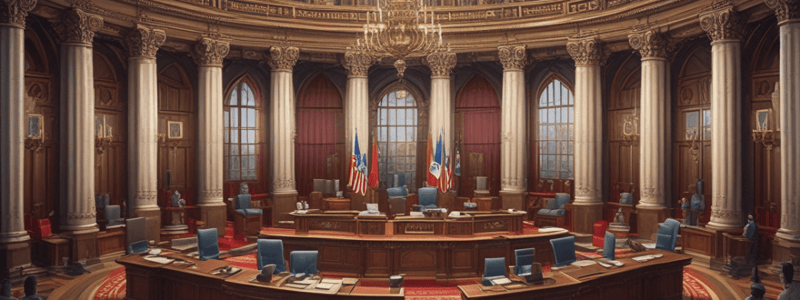Podcast
Questions and Answers
Which of the following best describes the separation of powers in a presidential system?
Which of the following best describes the separation of powers in a presidential system?
- The separation of powers is the same in both presidential and parliamentary systems.
- There is no clear separation of powers in a presidential system.
- The separation of powers is less distinct, with the cabinet taking on many responsibilities traditionally assigned to other branches.
- The separation of powers is more pronounced, with the president's role clearly defined and protected by the constitution. (correct)
How do checks and balances operate in a presidential system compared to a parliamentary system?
How do checks and balances operate in a presidential system compared to a parliamentary system?
- Parliamentary systems have stronger checks and balances than presidential systems, as the legislature can more easily remove the executive.
- Presidential systems generally provide stronger protections against tyranny of the majority through the president's ability to veto acts passed by the legislature. (correct)
- Checks and balances are not a feature of either presidential or parliamentary systems.
- There is no meaningful difference in checks and balances between presidential and parliamentary systems.
Which branch of government has the most power in a parliamentary system?
Which branch of government has the most power in a parliamentary system?
- The legislative branch (the parliament)
- The judicial branch
- The executive branch (the cabinet and prime minister) (correct)
- All branches have equal power in a parliamentary system
How does the stability of government differ between presidential and parliamentary systems?
How does the stability of government differ between presidential and parliamentary systems?
Which system of government allows for greater legislative power?
Which system of government allows for greater legislative power?
How do presidential and parliamentary systems differ in terms of executive power?
How do presidential and parliamentary systems differ in terms of executive power?
Which of the following is a key difference between presidential and parliamentary systems in terms of executive power?
Which of the following is a key difference between presidential and parliamentary systems in terms of executive power?
How do presidential and parliamentary systems differ in terms of legislative power?
How do presidential and parliamentary systems differ in terms of legislative power?
What is a potential disadvantage of parliamentary systems mentioned in the text?
What is a potential disadvantage of parliamentary systems mentioned in the text?
Which of the following is a potential advantage of presidential systems mentioned in the text?
Which of the following is a potential advantage of presidential systems mentioned in the text?
What is a potential disadvantage of presidential systems mentioned in the text?
What is a potential disadvantage of presidential systems mentioned in the text?
Which of the following is a key difference between presidential and parliamentary systems in terms of the stability of government?
Which of the following is a key difference between presidential and parliamentary systems in terms of the stability of government?
Flashcards are hidden until you start studying
Study Notes
Advantages and Disadvantages of Presidential and Parliamentary Systems of Government
Presidential and parliamentary systems of government are two primary ways countries organize their political structure. While both systems have distinct advantages and disadvantages, understanding these differences is crucial for grasping how governments function. In this article, we explore the key features of each system, including separation of powers, checks and balances, executive power, legislative power, and stability of government.
Separation of Powers
Both systems aim to maintain balance among branches of government through separation of powers. However, they approach this challenge differently. In a presidential system, the separation of powers is typically more pronounced, with the president's role clearly defined and often protected by a constitution. By contrast, parliamentary systems tend to blur lines between different branches, with the cabinet taking on many responsibilities traditionally assigned to other branches.
Checks and Balances
In terms of checks and balances, presidential systems generally provide stronger protections against tyranny of the majority. This is because the president can veto acts passed by Congress, potentially limiting the influence of legislators when making decisions detrimental to minority groups. On the other hand, parliamentary systems rely heavily on party politics, which may lead to less scrutiny of proposed laws due to the lack of strong independent actors outside the larger political parties.
Executive Power
Executive power varies significantly under the two systems. In a presidential system, the president has considerable authority over foreign policy and military operations, while in a parliamentary system, these decisions are usually made by the head of government in consultation with either cabinet colleagues or elected representatives from his or her own party. As a result, presidents may face fewer constraints on their decision-making processes compared to prime ministers in parliamentary systems.
Legislative Power
Legislative power also differs between the two systems. In presidential systems, bicameralism allows for representation based on population size and geographic distribution, providing opportunities for smaller states to exert more influence. Conversely, unicameral parliaments reflect a country's overall diversity better, allowing for proportional representation that ensures minorities have a say. Additionally, some argue that single-party majorities inherent in parliamentary systems can stifle debate and limit dissenting voices in the legislature.
Stability of Government
Stability is another factor where significant variations exist between the two types of systems. Presidential systems tend to offer higher levels of predictability and stability, thanks to regular elections held for all members of Congress. This helps ensure accountability and reduces the likelihood of abrupt changes in government policies. However, these systems are not immune to instability; for instance, impeachment proceedings could disrupt governance temporarily.
By comparison, parliamentary systems might appear more democratic given their direct link between public opinion and immediate outcomes. But this close relationship could sometimes lead to snap elections triggered by events such as loss of confidence votes, causing potential instability. Nonetheless, stable cabinets formed after elections can bring continuity until the next polling event occurs.
In conclusion, while both presidential and parliamentary systems present unique advantages and disadvantages, it ultimately depends on societal values and historical context whether one system would work better than the other. A deeper understanding of these distinctions will aid citizens in evaluating their preferred mode of government representation.
Studying That Suits You
Use AI to generate personalized quizzes and flashcards to suit your learning preferences.




